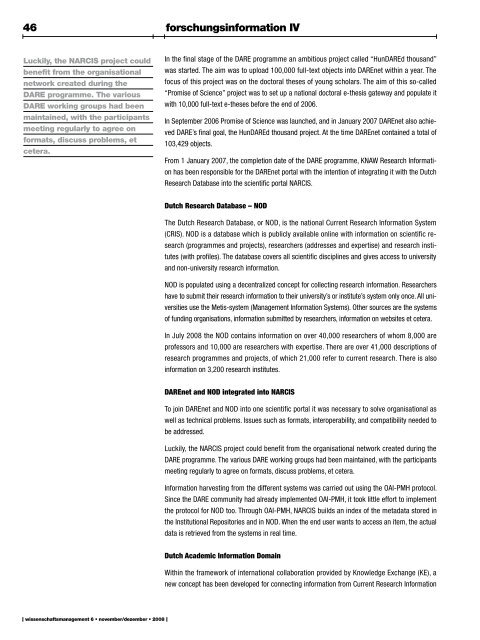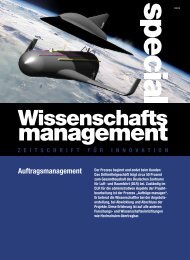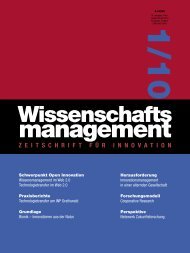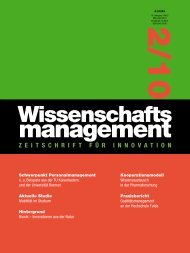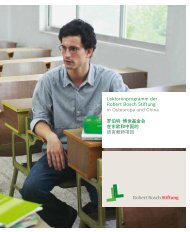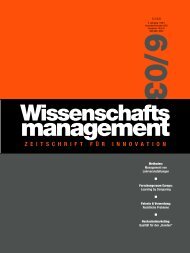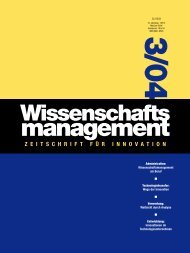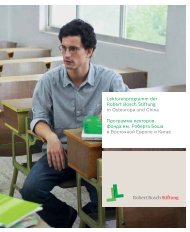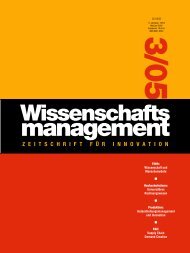Z e i t s c h r i f t f ü r i n n o v a t i o n - Lemmens Medien Gmbh
Z e i t s c h r i f t f ü r i n n o v a t i o n - Lemmens Medien Gmbh
Z e i t s c h r i f t f ü r i n n o v a t i o n - Lemmens Medien Gmbh
Erfolgreiche ePaper selbst erstellen
Machen Sie aus Ihren PDF Publikationen ein blätterbares Flipbook mit unserer einzigartigen Google optimierten e-Paper Software.
46 forschungsinformation IV<br />
Luckily, the NARCIS project could<br />
benefit from the organisational<br />
network created during the<br />
DARE programme. The various<br />
DARE working groups had been<br />
maintained, with the participants<br />
meeting regularly to agree on<br />
formats, discuss problems, et<br />
cetera.<br />
wissenschaftsmanagement 6 • november/dezember • 2008<br />
In the final stage of the DARE programme an ambitious project called “HunDAREd thousand”<br />
was started. The aim was to upload 100,000 full-text objects into DAREnet within a year. The<br />
focus of this project was on the doctoral theses of young scholars. The aim of this so-called<br />
“Promise of Science” project was to set up a national doctoral e-thesis gateway and populate it<br />
with 10,000 full-text e-theses before the end of 2006.<br />
In September 2006 Promise of Science was launched, and in January 2007 DAREnet also achieved<br />
DARE’s final goal, the HunDAREd thousand project. At the time DAREnet contained a total of<br />
103,429 objects.<br />
From 1 January 2007, the completion date of the DARE programme, KNAW Research Information<br />
has been responsible for the DAREnet portal with the intention of integrating it with the Dutch<br />
Research Database into the scientific portal NARCIS.<br />
Dutch Research Database – NOD<br />
The Dutch Research Database, or NOD, is the national Current Research Information System<br />
(CRIS). NOD is a database which is publicly available online with information on scientific research<br />
(programmes and projects), researchers (addresses and expertise) and research institutes<br />
(with profiles). The database covers all scientific disciplines and gives access to university<br />
and non-university research information.<br />
NOD is populated using a decentralized concept for collecting research information. Researchers<br />
have to submit their research information to their university’s or institute’s system only once. All universities<br />
use the Metis-system (Management Information Systems). Other sources are the systems<br />
of funding organisations, information submitted by researchers, information on websites et cetera.<br />
In July 2008 the NOD contains information on over 40,000 researchers of whom 8,000 are<br />
professors and 10,000 are researchers with expertise. There are over 41,000 descriptions of<br />
research programmes and projects, of which 21,000 refer to current research. There is also<br />
information on 3,200 research institutes.<br />
DAREnet and NOD integrated into NARCIS<br />
To join DAREnet and NOD into one scientific portal it was necessary to solve organisational as<br />
well as technical problems. Issues such as formats, interoperability, and compatibility needed to<br />
be addressed.<br />
Luckily, the NARCIS project could benefit from the organisational network created during the<br />
DARE programme. The various DARE working groups had been maintained, with the participants<br />
meeting regularly to agree on formats, discuss problems, et cetera.<br />
Information harvesting from the different systems was carried out using the OAI-PMH protocol.<br />
Since the DARE community had already implemented OAI-PMH, it took little effort to implement<br />
the protocol for NOD too. Through OAI-PMH, NARCIS builds an index of the metadata stored in<br />
the Institutional Repositories and in NOD. When the end user wants to access an item, the actual<br />
data is retrieved from the systems in real time.<br />
Dutch Academic Information Domain<br />
Within the framework of international collaboration provided by Knowledge Exchange (KE), a<br />
new concept has been developed for connecting information from Current Research Information


